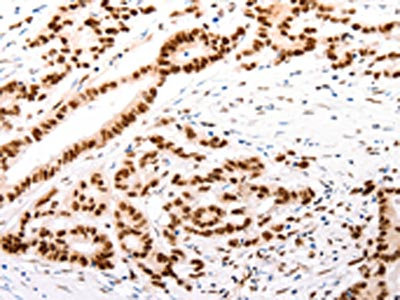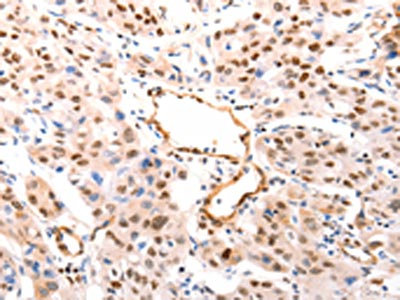
The image on the left is immunohistochemistry of paraffin-embedded Human colon cancer tissue using CSB-PA024373(CASP9 (active) Antibody) at dilution 1/80, on the right is treated with synthetic peptide. (Original magnification: x200)
CASP9 Antibody
CSB-PA024373
ApplicationsELISA, ImmunoHistoChemistry
Product group Antibodies
ReactivityHuman, Mouse
TargetCASP9
Overview
- SupplierCusabio
- Product NameCASP9 Antibody
- Delivery Days Customer20
- ApplicationsELISA, ImmunoHistoChemistry
- CertificationResearch Use Only
- ClonalityPolyclonal
- ConjugateUnconjugated
- Gene ID842
- Target nameCASP9
- Target descriptioncaspase 9
- Target synonymsAPAF3; APAF-3; apoptotic protease activating factor 3; apoptotic protease MCH-6; caspase 9, apoptosis-related cysteine peptidase; caspase-9; ICE-LAP6; ICE-like apoptotic protease 6; MCH6; PPP1R56; protein phosphatase 1, regulatory subunit 56
- HostRabbit
- IsotypeIgG
- Protein IDP55211
- Protein NameCaspase-9
- Scientific DescriptionThis gene encodes a member of the cysteine-aspartic acid protease (caspase) family. Sequential activation of caspases plays a central role in the execution-phase of cell apoptosis. Caspases exist as inactive proenzymes which undergo proteolytic processing at conserved aspartic residues to produce two subunits, large and small, that dimerize to form the active enzyme. This protein is processed by caspase APAF1; this step is thought to be one of the earliest in the caspase activation cascade. Alternative splicing results in two transcript variants which encode different isoforms.
- ReactivityHuman, Mouse
- Storage Instruction-20°C or -80°C
- UNSPSC12352203

